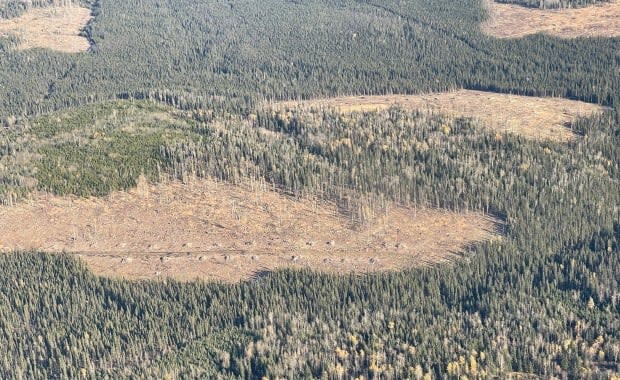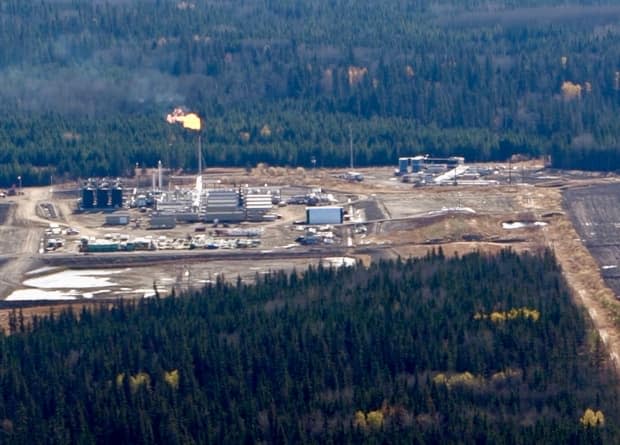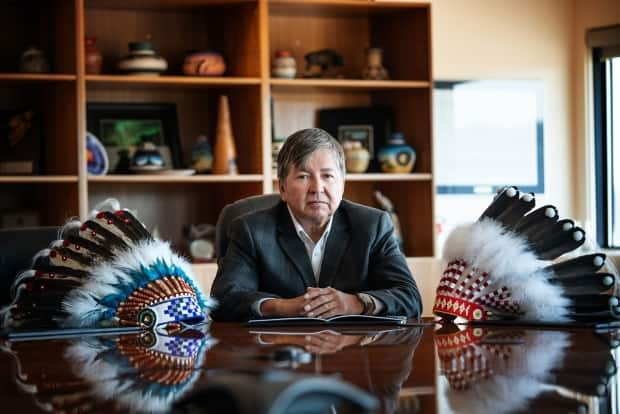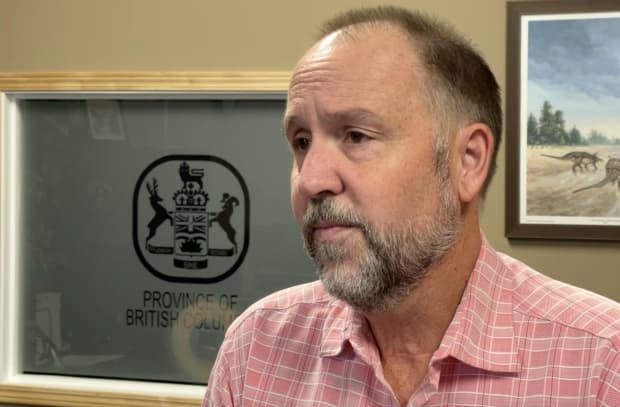How a big win for a First Nation in B.C. could bring change for resource development in Canada

From a helicopter hovering more than 100 metres in the air, Blueberry River First Nations Chief Marvin Yahey surveyed his community's territory in northeastern British Columbia.
Looking over the vast landscape of trees, muskeg and rivers drenched in sun, Yahey pointed to sites that have been important to generations of his ancestors — like a lake where ingredients for traditional medicine could be gathered.
But more often during the flight, he gestured to the patchwork of development marking the landscape: roads, forestry cutblocks, pipelines, natural gas wells and facilities.
"Have you seen any moose?" he asked, turning to elder Jerry Davis, who was looking out a side window from the back of the aircraft.
"No," Davis said — a response he repeated to the same question near the end of the two-hour flight.
Asked about the scene later, Yahey said it was "extremely frustrating" to see so much development in the traditional territory.
"To have an aerial view, it's mind-boggling — but that's the activities we've lived with for many generations," he said.
It was similar frustration that led to a lawsuit six years ago — and to what's been called a precedent-setting court decision that could have implications for resource development elsewhere in Canada.
This summer, a B.C. Supreme Court judgment agreed with Blueberry River's 2015 claim that years of extensive industrial development in the region violated the Treaty 8 rights of the Blueberry River First Nations.
The Court said the province failed to maintain the nation's rights to hunt, fish and trap without interference. While no single project had a devastating effect on the community, the court said the cumulative impact of a series of projects limited the nation's ability to maintain its rights.

The ruling also gave the province six months to work with Blueberry River to improve land management and the permitting process to respect the nation's rights under the treaty. Those discussions are ongoing.
"What's left to be negotiated is how we deal with applications for development going into the future, land protection, land management in the future," said Maegen Giltrow, a lawyer for the Blueberry River First Nations.
She said Blueberry River does have decision-making power now over the land "because developments that will further infringe, pursuant to the court's direction, can't proceed without Blueberry's involvement and consent."
The outcome of talks with the province will be significant for Blueberry River First Nations and northeast B.C., but the case has also seized attention in other jurisdictions.
First Nations are examining what it could mean elsewhere, including to future development near Alberta's massive oilsands.
"The decision is quite incredible," said Chief Mel Grandjamb of the Fort McKay First Nation in northeastern Alberta. "Moving forward, Fort McKay will expect our seat at the decision making [table] when it comes to projects moving ahead in our traditional lands."
Sander Duncanson, a Calgary-based lawyer whose practice represents a number of companies operating in northeastern B.C., said industry is watching as well.
He said the court's decision "does change the law in Canada and potentially opens the door to similar claims all across the country from Indigenous groups."
A hub of industrial activity
Blueberry River's traditional territory is located in the upper Peace River region of northeastern B.C., representing about 38,000 square kilometres.
Yahey said things were already busy when the nation launched its lawsuit against the province six years ago. Today, the area is teeming with activity, a draw for workers in forestry, the Montney gas basin and the massive Site C hydroelectric dam that's under construction.

The trial heard that over 84 per cent of Blueberry River territory is within 500 metres of an industrial disturbance. Hunting, fishing and trapping had become increasingly difficult.
Lawyers for the province argued at trial that no rights had been violated and that the provincial government has the power to take up lands within the treaty territory for specific purposes.
But in her decision, B.C. Supreme Court Justice Emily Burke said the province's power to take up lands is not infinite and "must be exercised in a way that upholds the promises and protections in the treaty."
She said that by allowing industrial development in Blueberry River's territory at an extensive scale — without assessing cumulative impacts and ensuring Blueberry River's ability to continue meaningfully exercising its treaty rights — the province breached the treaty.

Linda Chipesia, a past Blueberry River chief and a Calgary-based lawyer, said the ruling means there must be a balance for lands taken up and protection of the treaty right to hunt, fish and trap meaningfully.
"After all these years, Blueberry members were proven right and were heard," said Chipesea in an email interview, adding she hopes it'll give the nation a real voice in protecting important habitat and the environment.
First Nations, industry are watching
With the province choosing not to appeal, it's now working with the nation to develop land management processes in Blueberry River territory that restore and protect the ability of the land to support Indigenous ways of life.
Earlier this month, the B.C. government signed an interim agreement with Blueberry River First Nations to provide $65 million in funding to support land restoration and cultural programs.
The agreement also saw the restart of 195 forestry and oil and gas projects that had been placed on hold due to the court's ruling.
But 20 other projects, which had been approved, will not proceed without negotiation with the First Nation because they relate to development in areas of cultural importance.
Yahey called the interim agreement a "historical moment" but added that there's still a lot of work to do.
WATCH | How industrial development has impacted the Blueberry River First Nations' ability to hunt and fish:
In Calgary, Duncanson, a lawyer with Osler, Hoskin & Harcourt, said this month's announcement that 20 previously authorized projects will still require agreement from Blueberry, may provide some insight as to what's being contemplated in negotiations.
"There's still a lot of uncertainty around what the final agreement between the province and Blueberry will ultimately contain," he said.
"But it now looks fairly clear that one of the components will be a recognition that there will be certain areas where development cannot proceed without Blueberry's consent."
He said companies are paying attention to how things develop.
"The companies that have developments in northeast B.C., many of those same companies do have developments elsewhere in Canada as well, and they are certainly aware of the fact that what's happening there could happen elsewhere, too."

B.C. Liberal MLA Mike Bernier, the former mayor of nearby Dawson Creek, said he was surprised when the NDP government didn't appeal the ruling.
"Does this mean a veto for our local First Nations? Most people are hoping it's not a veto but it actually just brings people to the table for that really meaningful discussion of how we are going to move these projects forward," he said.
In an email statement, the Canadian Association of Petroleum Producers said it is encouraging the province to reach an agreement with Blueberry River soon as soon as practical," so producers with operations in the area can start [to] plan their activities and budgets for 2022 and beyond."
Yahey has said that his members are open to industrial development, so long as it is done sustainably and with Indigenous approval. He said the future will be about striking a "proper balance" and taking care of the environment will be key.
"I'm extremely excited. I'm relieved," he said. "And, yeah, all the mixed emotions there."

Grandjamb of the Fort McKay First Nation believes the ruling has application in Alberta as well.
"Alberta has to change the way they do business," Grandjamb said, who'll be watching to see if the province accepts that First Nations need to be a part of decision making on future development in their territory.
"It's in their best interest to do so, because if not, Fort McKay will definitely be there to help them understand what treaty rights are."

 Yahoo Finance
Yahoo Finance